| 2004 |

|
YEAR BOOK |
Higher Education Authority – A tÚdarás Um Ard-Oideachas
|
HEA – Enabling quality research in higher education
|
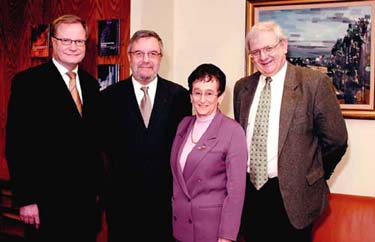
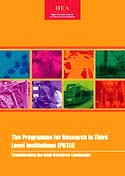
PRTLI – 'backbone of Irish Research Infrastructure' say International Assessors
A key task set in the HEA Strategy Statement 2004-2007 was the evaluation of the impact of the Programme for Third Level Institutions (PRTLI), which has allocated €605m since 1999.
An independent International Assessment Committee, appointed by the HEA in the second half of 2003, considered progress made by the PRTLI in meeting its objectives since its inception. The Committee was chaired by Prof. Enric Banda, currently director of the Catalan Research Foundation and former Secretary-General of the European Science Foundation (to end 2003). Prof. Banda was joined on the Committee by Prof. Reijo Vihko (President of the Academy of Finland, to end March 2004), Prof. John Morrill (Professor of British and Irish History, Cambridge, UK, and Acting Master of Selwyn College, Cambridge) and Prof. Lauren Resnick (Professor of Psychology and Director of the Institute for Learning, University of Pittsburgh, USA).
The review involved, over a period of eight months, in the region of 100 international experts and peers, engaging directly with approximately 400 individuals in over 40 institutions and organisations. Site visits were held, together with desk reviews, bibliometric analysis, data and information collation, interviews and meetings. The work was supported by two independent consultancy groups.
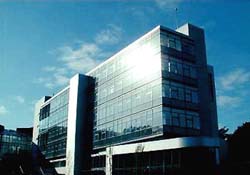
-
l 97,000 square metres of new research space, including almost 20,000 square metres of new library space.
-
5,800 new research spaces and 1,600 new library spaces for researchers.
-
New capital equipment for advanced research to the value of €135 million, as well as €260 million for new research buildings.
-
34 senior researchers and professors (14 at professor level), 750 principal investigators, 450 postdoctoral appointments, almost 1,000 additional postgraduate posts for research, and 70 research assistant posts.
-
Facilities for 1,200 postgraduate students, funded from other sources and currently based in PRTLI centres.
-
Production of 60 patent applications.
-
Leverage of an additional €250 million for more than 1,000 new awards for research within PRTLI funded areas.
The assessors strongly recommend a continuation of Government support for the programme.
Professor Enric Banda states:
|
'…we believe that PRTLI marks the beginning of a major and most beneficial transformation of the research landscape of Ireland that will help to install an innovation-driven economy.'
|
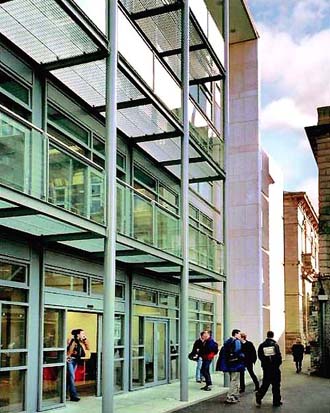
North South Research – an all island solution
A new development in the second half of 2003 and early 2004 was the provision of support for collaborative research and development between third-level institutions North and South of the island under two distinct research programmes. This is the first time that specific monies have been set aside by the Irish Government and the European Union for targeted collaborative research work on the island.
The North South Programme for Collaborative Research
One programme, the North South Programme for Collaborative Research, has been established as part of a commitment made by the Irish Government in the National Development Plan, and covers the period 2003–2006. €5.5m has been allocated by the Government to 21 cross-border university research projects which are to be carried out during the next 2–3 years. The North South Programme for Collaborative Research supports research and development between third-level institutions in Ireland and Northern Ireland. The particular focus of this programme is to enhance research capabilities on the island of Ireland.
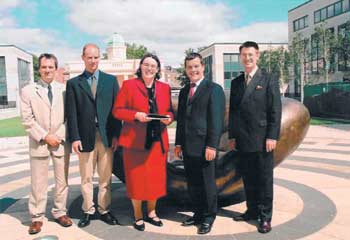
A total of nine institutions are in receipt of funding. The successful projects cover a wide range of far-reaching disciplines including Irish history, Irish film, economics, encoding of scholarly texts, research evaluation, biosciences, biomedicine, conservation, nanotechnology and ICT. The underpinning objective of these diverse projects is to recognise the benefits to be gained by having agreed strategy and joint programmes. A full list of projects funded is available at www.hea.ie .
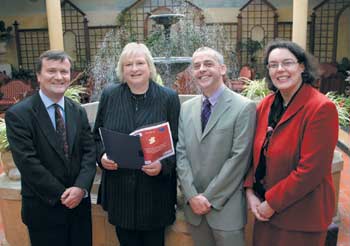
The Cross Border Programme for Research and Education contributing to Peace and Reconciliation
The second programme, the Cross Border Programme for Research and Education contributing to Peace and Reconciliation, a joint initiative of the Department of Education and Science, Dublin, and the Department for Employment and Learning, Northern Ireland, introduces a new vector for addressing peace and reconciliation problems via research and education. This programme managed by the HEA supports research and development in third level institutions on the island so as to reap benefits for Northern Ireland and the border counties in particular, with the specific objective of impacting positively on peace building and reconciliation. The Programme is funded under the PEACE II programme, administered by the Special EU Programmes Body.
The programme was launched by Ms Síle De Valera T.D., Minister of State, Dept. of Education & Science, in Cavan, in May 2004. Speaking at the launch, the Minister said:
|
'The Good Friday Agreement has transformed the landscape of this island. Whereas a high level of co-operation already existed within higher education, specifically funded programmes in the research area are new.'
|
|
'While of course researchers both North and South have collaborated, often on an informal basis, for many years, this is the first time that a joint initiative between the governments has produced a fund with the explicit aim of supporting collaborative research projects between universities on both sides of the border.'
|
As part of this programme, five universities and one Institute of Technology, north and south of the border, shared over €3m in a new joint research programme that is being funded by the EU aimed at supporting the peace and reconciliation process.
The projects aided under the initiative are:
-
Equality and Social Inclusion: a framework for peace and stability in Ireland:
(QUB and UCD)
-
Intergenerational transmission and ethno-national identity in the border area:
(UCD and QUB)
-
Virtual research centre for Point-of-Care technology: POC Sensors Ireland:
(DCU and UU)
-
E-Consultation: evaluating appropriate technologies and processes for citizens' participation in public policy:
(QUB, NUIM and Letterkenny Institute of Technology)
-
Mapping frontiers, plotting pathways: routes to North-South cooperation in a divided Island:
(UCD and QUB)
Dr Meehan commented:
|
"The HEA is delighted to see that through the HEA investments, knowledge is being created in areas as diverse as biomedicine, material sciences, the environment and the humanities. The funding of good quality research in any area can potentially reap benefits for all society and this has been acknowledged by the SEUPB's funding for the Cross Border Research and Education initiative. As stated in the Strategy Statement 2004-2007, the HEA will continue
"to foster the development of a higher education sector….. which has the capacity to address the changing needs and challenges in our society."'
|

|

|

|
Contact: Dr Eucharia Meehan, Head of Research Programmes, Higher Education Authority;
Web: www.hea.ie